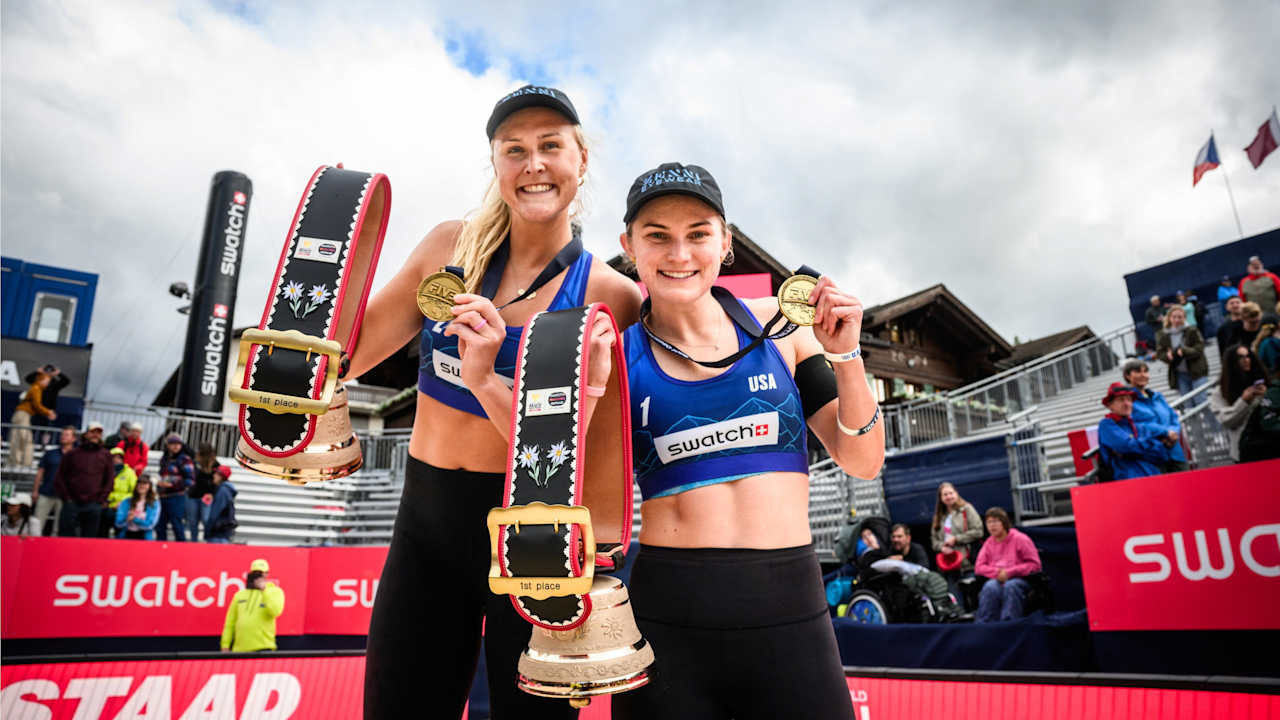The Beach Pro Tour Finals in Doha, Qatar, saw one of the most thrilling endings to a season, capped by an all-American gold medal match that left the world buzzing. Kristen Nuss and Taryn Kloth, two of the most formidable figures in beach volleyball, took the stage against their fellow Americans, Terese Cannon and Megan Kraft, in what proved to be the ultimate showdown of the year. The victory, which cemented Nuss and Kloth’s second consecutive gold at the event, came not only with the thrill of winning but also with the heavy weight of a legacy—one that has defined American beach volleyball for the past three years. It was a dramatic, emotional, and thoroughly deserved triumph for the duo, who capped off a year full of breathtaking performances. But more than just the victory, it marked the end of the 2022-2024 Olympic quad, one of the most successful periods in American beach volleyball history.
Here's ads banner inside a post

A Moment of Uncertainty on the Court
The gold medal match itself was not without its share of dramatic moments. Nuss and Kloth were already leading 1-0 in sets, and in the second set, they had a commanding 19-17 lead. The prize was within reach, and the possibility of becoming the first repeat champions at the Beach Pro Tour Finals since Germans Laura Ludwig and Kira Walkenhorst in 2016 and 2017 seemed almost assured. And yet, in a seemingly bizarre moment, Nuss found herself, for perhaps the first time in her career, in a rare state of relaxation during an intense point.

Here's ads banner inside a post
As Kloth set up for a transition play following an incredible dig by Nuss, who had just made a jaw-dropping defensive move to scoop a high line shot from Cannon, the game shifted to a slower pace. Instead of rushing into her usual approach to finish the point, Nuss stayed on the sand, seemingly enjoying the brief pause in the frantic pace of her season. It was an odd sight, a stark contrast to the high-energy style of play that Nuss and Kloth have become known for.

It didn’t take long, however, for Nuss to snap back into focus. Upon realizing that Kloth was setting the ball instead of sending it over the net as Nuss had anticipated, the moment of uncertainty was quickly replaced by an instinctual sprint. Nuss, with characteristic speed and precision, leaped to her feet and launched into her familiar approach, using the smallest window of opportunity to execute a perfectly timed cut shot from an awkward position. The result? One of the most memorable kills of the match, a point that essentially sealed the victory for the American duo.
Here's ads banner inside a post
“It was going to be glorious or an error,” Nuss quipped after the match, reflecting on the absurdity of her shot, which, in that moment, was indeed nothing short of glorious.
The Final Push: A Test of Resilience
The match ended with Nuss and Kloth clinching the victory 21-19, 21-17. It wasn’t just the technical brilliance that set them apart but the emotional and mental resilience they displayed. Throughout the entire tournament, the pair had been relentless, refusing to give up even when the odds seemed stacked against them. Their partnership had been forged over countless hours of practice and competition, and in Doha, it was clear that their bond was unbreakable.

But beyond the individual triumph, the win was a testament to the strength of American beach volleyball. With Nuss and Kloth’s victory, the United States cemented its dominance in the sport over the past few years, culminating in three consecutive seasons where American teams claimed victory at the Beach Pro Tour Finals.
The Paris Quad: A Time of Reflection and Triumph
For many, the Paris Olympic quad will be remembered as a time of unprecedented success for American beach volleyball, albeit with one glaring exception: the lack of an Olympic medal. As the first Olympic cycle since beach volleyball’s inclusion in the Games to not see an American team medaling, the Paris Olympics left a bittersweet taste for players like Nuss and Kloth, who entered the tournament as favorites to challenge Brazil’s Ana Patricia and Duda for gold. Unfortunately, despite their best efforts, they were eliminated early, finishing in ninth place—far below expectations. Similarly, fellow American pairs Kelly Cheng and Sara Hughes, as well as Chase Budinger and Miles Evans, also failed to reach the podium in Paris, leaving many to question what went wrong.
However, this narrow focus on the Olympics overlooks the broader context of the quad. Despite their Olympic disappointment, Nuss and Kloth’s performance throughout the rest of the cycle was nothing short of extraordinary. The pair’s consistency on the Beach Pro Tour, coupled with their dominance in other major competitions, was undeniable. Their second-place finish at the World Championships in 2023, along with their multiple victories in prestigious tournaments such as Gstaad, Hamburg, and Vienna, were clear indicators of their skill and resilience. The success wasn’t just limited to Nuss and Kloth; it was a collective achievement for American beach volleyball, with multiple American teams reaching the podium and collecting medals in every major competition.

A Legacy of Dominance
The Paris quad, despite the Olympic setback, stands as the most successful period in American beach volleyball history. The United States has dominated the Beach Pro Tour, consistently earning golds, silvers, and bronzes at the highest level of competition. In fact, over the past three years, American teams have claimed 53 medals in Challenge and Elite16 events, along with victories at the Beach Pro Tour Finals and World Championships. The depth of American talent has never been greater, as evidenced by the impressive performances of teams like Cannon and Kraft, who have medaled four times in a row at the top level, and the emergence of rising stars like Molly Shaw and Toni Rodriguez.

Moreover, the future of American beach volleyball looks incredibly bright. With a growing pool of talent, including standout NCAA players, the United States is poised to continue its dominance on the international stage. The depth of the women’s game, in particular, has never been more formidable, as American teams routinely challenge for top spots in every major tournament.
The Heart of American Beach Volleyball
As Nuss and Kloth stood on the podium in Doha, accepting their gold medals, it was impossible to ignore the larger narrative at play. Their victory was not just the culmination of a single tournament, but the embodiment of a broader, national success. It was a reflection of the hard work, passion, and determination that defines the sport in the United States.

Looking ahead, there’s no reason to doubt that American beach volleyball will continue to thrive. As Nuss and Kloth demonstrated in Doha, and as countless other American teams have shown throughout the quad, the United States remains a dominant force in the sport. And while the Olympic gold may have eluded them this time, there is no doubt that American beach volleyball is on the rise, and the future looks brighter than ever.
In the end, Nuss and Kloth’s gold medal in Doha was more than just a victory on the court—it was the perfect exclamation point on a remarkable quad that will be remembered as a golden era in American beach volleyball history.


